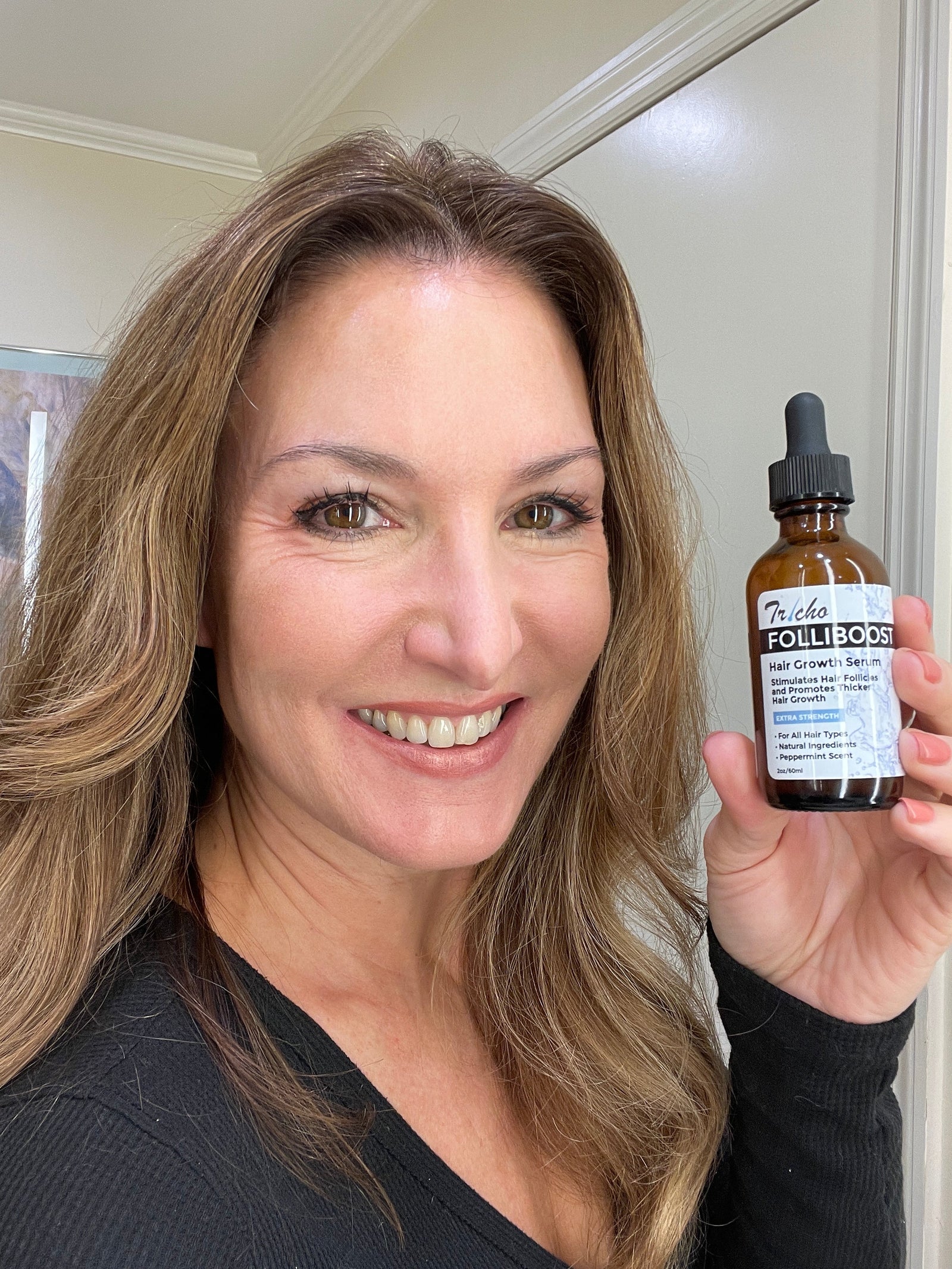Your Cart is Empty
Thicker, Fuller Hair Without the Side Effects.
Thicker, Fuller Hair Without the Side Effects.
Thicker, Fuller Hair Without the Side Effects.
March 18, 2025 4 min read
Experiencing hair loss can be a distressing issue for women, particularly when reaching their 50s. Although frequently associated with men, hair loss in women during mid-life is more common than many realise. For women, beautiful and healthy hair is often closely connected with confidence, and losing it can therefore negatively impact self-esteem and overall wellbeing.
Women in their 50s, transitioning through menopause, often notice changes in their hair, including thinning, excessive shedding, and a more fragile texture. While these changes can feel overwhelming, understanding the causes behind hair loss, and learning about effective solutions, can empower women to regain control and restore confidence.
The onset of menopause is one of the most significant triggers for hair loss in women entering their 50s. During menopause, oestrogen levels in a woman's body decrease significantly. As this happens, hair follicles become increasingly sensitive to androgens (male hormones present in small amounts in women). This shift contributes to thinning hair and can lead to female-pattern baldness.
Additionally, lower oestrogen means a shorter growth phase for each hair follicle. Consequently, hair falls out more rapidly and regrows more slowly, causing overall density and coverage to decline noticeably.
Hormone fluctuations associated with perimenopause and menopause can dramatically affect hair growth and hair health. Reduced levels of oestrogen can disrupt the hair growth cycle and cause increased shedding.
A balanced diet is always essential for healthy hair growth, but as women age, factors such as iron, protein, zinc, and vitamin B12 deficiencies often become increasingly significant. These nutrients play vital roles in maintaining strong, resilient hair.
Stressful life events or chronic stress can trigger a condition known as telogen effluvium, resulting in widespread hair shedding. A busy mid-life, characterised by personal, professional, and health concerns, can raise stress levels considerably, making women in their 50s vulnerable to hair thinning.
Certain medical conditions, such as thyroid disorders, autoimmune diseases, or anaemia, can cause hair loss. Similarly, medications commonly prescribed for blood pressure, depression, or arthritis might list hair loss as a side effect.
Adopting healthier lifestyle choices can provide significant improvements in hair condition. Increasing the intake of nutrients crucial for hair health, such as protein-rich foods, leafy green vegetables, iron-rich foods, fatty fish, and biotin supplementation, can help strengthen hair follicles and encourage growth.
Regular physical exercise isn't just beneficial for overall health; it can stimulate blood circulation in the scalp, supplying essential nutrients that promote healthier hair growth. Taking steps to manage stress effectively—such as meditation, yoga, or hobbies—is another excellent approach to addressing hair loss triggered by emotional upheaval.
When lifestyle changes are not sufficient, medical treatments can make a noticeable difference. Minoxidil, FDA-approved and clinically-backed, is a topical solution widely recommended for women experiencing hair loss. Regular application can slow hair thinning, stimulating regrowth and making hair appear thicker and denser.
Hormone Replacement Therapy (HRT) may be an option for some menopausal women, provided that it aligns with their overall health profile. HRT can address hormonal imbalances effectively, reducing hair fall and improving hair quality. However, HRT can have other health implications and should only be undertaken with thorough professional medical advice.
Adopting gentle hair care practices helps prevent additional hair damage. Women experiencing thinning hair should avoid excessively tight hairstyles, heat styling tools, and harsh chemical treatments, such as bleaching or frequent colouring. Regular scalp massage is beneficial as it boosts circulation, alleviating stress, and promoting healthier hair follicles.
If hair loss is persistent or severe, women should consult medical professionals, such as dermatologists or trichology specialists. They can accurately diagnose the root causes of hair loss, recommending tailored treatments, lifestyle adjustments, or dietary supplementation designed for personal wellness needs and hair re-growth.
The emotional toll hair loss takes on women in their 50s should not be underestimated. Beyond physical solutions, psychological support and reassurance from supportive communities or professional counselling can help women regain self-confidence.
If you're seeking an effective solution for hair loss in women in their 50s, consider trying Folliboost. This scientifically-formulated hair growth serum is specially designed for women facing menopause-related hair thinning. Enriched with natural ingredients, vitamins, and botanicals, Folliboost strengthens hair follicles, reduces shedding, and encourages thicker, shinier hair, helping women regain their hair vitality and their confidence.
Hair loss in women in their 50s is a sensitive issue, deeply connected to identity, confidence, and femininity. By recognising the myriad causes—from hormonal fluctuations and nutritional deficiencies to stress and lifestyle factors—women can actively address hair thinning, looking towards effective treatments and lifestyle interventions to reclaim their hair health.
Regardless of the approach chosen, women experiencing hair loss in their 50s should remember they're not alone. With sensible self-care tactics, scientifically-backed treatments, and compassionate support, hair health can be restored and confidence rebuilt, enabling women to embrace the challenges and triumphs of their 50s with positivity.
